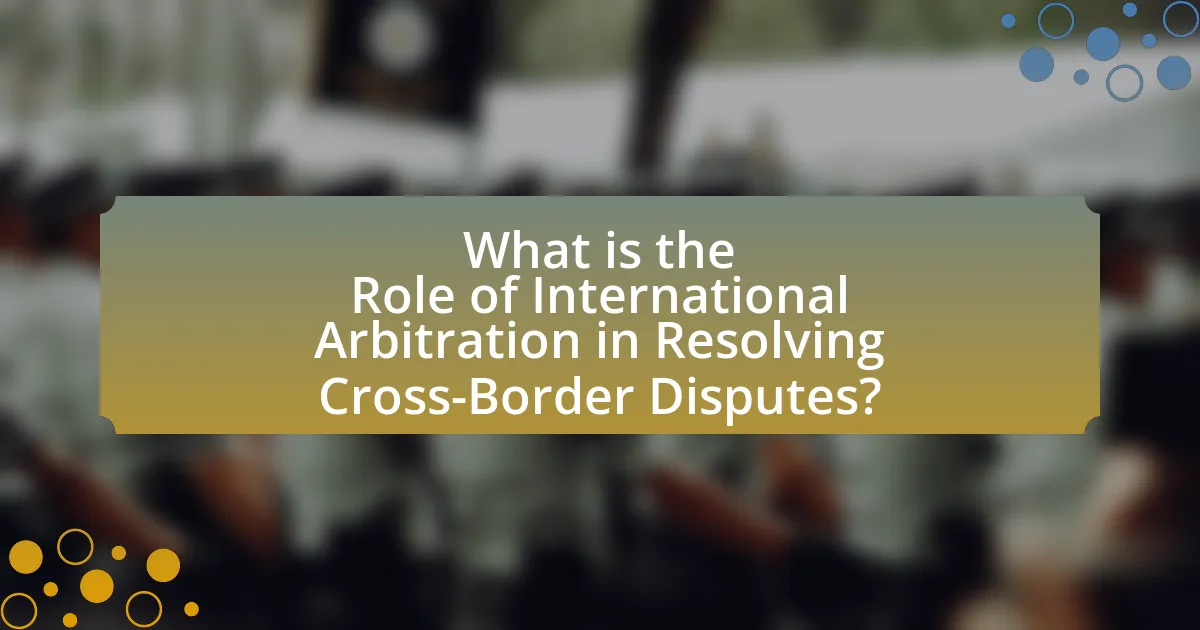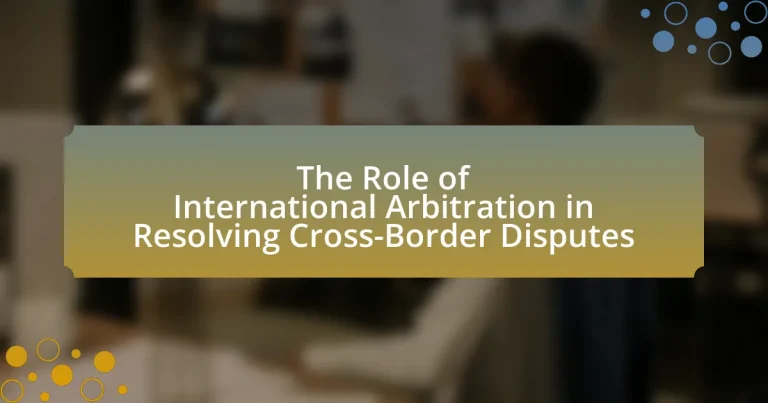International arbitration is a vital mechanism for resolving cross-border disputes, providing a neutral forum for parties from different jurisdictions to settle conflicts efficiently and fairly. Governed by established rules and procedures, this process ensures enforceability of awards under the New York Convention, which has been ratified by over 160 countries. The article explores how international arbitration functions, its key governing principles, advantages over national litigation, and the challenges it faces. Additionally, it highlights the impact of international arbitration on global trade and investment, emerging trends, and best practices for parties involved in arbitration proceedings.

What is the Role of International Arbitration in Resolving Cross-Border Disputes?
International arbitration serves as a crucial mechanism for resolving cross-border disputes by providing a neutral forum for parties from different jurisdictions to settle their conflicts. This process is governed by established rules and procedures, which enhance fairness and efficiency in dispute resolution. According to the International Chamber of Commerce, arbitration is favored for its ability to offer enforceable awards under the New York Convention, which has been ratified by over 160 countries, ensuring that arbitral decisions are recognized and enforced globally. This widespread acceptance underscores the effectiveness of international arbitration in facilitating trade and investment by minimizing the risks associated with cross-border disputes.
How does international arbitration function in the context of cross-border disputes?
International arbitration functions as a mechanism for resolving cross-border disputes by providing a neutral forum where parties from different jurisdictions can present their cases to an impartial arbitrator or panel of arbitrators. This process allows for the enforcement of arbitration agreements and awards across borders, as established by the New York Convention on the Recognition and Enforcement of Foreign Arbitral Awards, which has been ratified by over 160 countries. The arbitration process typically involves the selection of arbitrators, the establishment of procedural rules, and the conduct of hearings, culminating in a binding decision that is recognized internationally, thus facilitating the resolution of disputes without resorting to national courts.
What are the key principles that govern international arbitration?
The key principles that govern international arbitration include party autonomy, neutrality, and the principle of competence-competence. Party autonomy allows parties to choose the rules, procedures, and even the arbitrators, reflecting their preferences and needs. Neutrality ensures that the arbitration process is impartial, often achieved by selecting a neutral venue and arbitrators from different jurisdictions. The principle of competence-competence grants arbitrators the authority to rule on their own jurisdiction, allowing them to address any challenges to their authority without court intervention. These principles are foundational to the effectiveness and acceptance of international arbitration as a method for resolving cross-border disputes.
How does the arbitration process differ from litigation in national courts?
The arbitration process differs from litigation in national courts primarily in its flexibility and confidentiality. Arbitration allows parties to choose their arbitrators, set procedural rules, and often resolve disputes more quickly than the formal court system, which follows strict procedural guidelines and is subject to public scrutiny. Additionally, arbitration awards are generally final and binding, with limited grounds for appeal, whereas court decisions can be appealed through multiple levels of the judicial system. This distinction is significant in international contexts, where parties may prefer arbitration to avoid the complexities and uncertainties of national legal systems.
Why is international arbitration preferred for resolving cross-border disputes?
International arbitration is preferred for resolving cross-border disputes due to its neutrality, efficiency, and enforceability. Neutrality is crucial as it allows parties from different jurisdictions to avoid home-court advantages, fostering a fair process. Efficiency is achieved through streamlined procedures that often lead to quicker resolutions compared to traditional court systems, which can be bogged down by lengthy processes. Furthermore, the 1958 New York Convention facilitates the enforcement of arbitration awards in over 160 countries, providing a reliable mechanism for parties to uphold their rights internationally. This combination of neutrality, efficiency, and strong enforceability makes international arbitration a favored choice for resolving cross-border disputes.
What advantages does international arbitration offer to parties involved?
International arbitration offers several advantages to parties involved, including neutrality, enforceability, and expertise. Neutrality ensures that disputes are resolved in a location and under a legal framework that is impartial to both parties, reducing bias. Enforceability is supported by international treaties like the New York Convention, which facilitates the recognition and enforcement of arbitration awards in over 160 countries. Additionally, parties can select arbitrators with specific expertise relevant to their dispute, ensuring informed decision-making. These factors collectively enhance the efficiency and effectiveness of resolving cross-border disputes.
How does international arbitration ensure neutrality and fairness?
International arbitration ensures neutrality and fairness by employing a structured process that includes the selection of impartial arbitrators, adherence to established procedural rules, and the application of internationally recognized legal standards. The selection process allows parties to choose arbitrators with no conflicts of interest, ensuring that decisions are made without bias. Furthermore, arbitration institutions, such as the International Chamber of Commerce (ICC) and the London Court of International Arbitration (LCIA), provide frameworks that promote transparency and equal treatment of all parties involved. These institutions often require arbitrators to disclose any potential conflicts and follow procedural guidelines that uphold fairness, such as allowing both parties equal opportunities to present their cases. This systematic approach is supported by the 1958 New York Convention, which facilitates the enforcement of arbitration awards globally, reinforcing the legitimacy and fairness of the arbitration process.
What are the challenges associated with international arbitration?
The challenges associated with international arbitration include issues of enforceability, jurisdictional conflicts, and varying legal standards across jurisdictions. Enforceability can be problematic due to differing national laws and the potential for local courts to refuse recognition of arbitration awards, as evidenced by the 1958 New York Convention, which aims to facilitate enforcement but is not universally adopted. Jurisdictional conflicts arise when parties dispute the appropriate forum for arbitration, leading to delays and increased costs. Additionally, varying legal standards can create inconsistencies in procedural and substantive law, complicating the arbitration process and potentially affecting the outcome. These challenges highlight the complexities inherent in resolving cross-border disputes through international arbitration.
What common issues arise during the arbitration process?
Common issues that arise during the arbitration process include procedural delays, challenges to the arbitrator’s impartiality, and difficulties in enforcing arbitral awards. Procedural delays often occur due to complex case management or the parties’ failure to comply with timelines, which can prolong the resolution of disputes. Challenges to the arbitrator’s impartiality may arise when one party questions the neutrality of the arbitrator, potentially leading to recusal or replacement, which can further delay proceedings. Additionally, enforcing arbitral awards can be problematic, especially in jurisdictions where local laws may not recognize or support international arbitration agreements, leading to complications in the execution of the award. These issues are well-documented in arbitration literature, highlighting the need for effective management and clear legal frameworks to mitigate such challenges.
How can parties mitigate risks in international arbitration?
Parties can mitigate risks in international arbitration by carefully drafting arbitration clauses that specify the governing law, the seat of arbitration, and the rules to be applied. Clear and precise arbitration agreements reduce ambiguity and potential disputes over procedural issues. Additionally, parties should conduct thorough due diligence on the arbitrators’ qualifications and backgrounds to ensure impartiality and expertise relevant to the dispute. Engaging in pre-arbitration negotiations or mediation can also help resolve issues before they escalate to arbitration, thereby minimizing costs and time. Furthermore, utilizing institutional arbitration services, which provide established frameworks and support, can enhance procedural efficiency and reduce risks associated with enforcement of awards.
How does international arbitration impact global trade and investment?
International arbitration significantly enhances global trade and investment by providing a neutral and efficient mechanism for resolving disputes between parties from different jurisdictions. This process reduces the risks associated with cross-border transactions, as it offers enforceable decisions that are recognized in multiple countries under treaties like the New York Convention. According to the International Chamber of Commerce, 90% of businesses prefer arbitration for international disputes due to its confidentiality and speed compared to traditional court systems. This preference fosters a more stable investment climate, encouraging foreign direct investment, which reached $1.5 trillion globally in 2020, as investors feel more secure knowing there is a reliable dispute resolution framework in place.
What are the trends shaping the future of international arbitration?
The trends shaping the future of international arbitration include increased reliance on technology, a focus on efficiency and cost-effectiveness, and the growing importance of transparency and ethical considerations. Technology, such as artificial intelligence and online dispute resolution platforms, is streamlining processes and making arbitration more accessible. According to a 2021 report by the International Chamber of Commerce, 70% of arbitration practitioners believe that technology will significantly impact the future of arbitration. Additionally, there is a push for expedited procedures and reduced costs, as parties seek quicker resolutions. Transparency is also becoming crucial, with stakeholders advocating for clearer rules and ethical standards to enhance trust in the arbitration process.
What best practices should parties follow when engaging in international arbitration?
Parties engaging in international arbitration should adhere to several best practices to ensure an effective process. First, they must clearly define the arbitration agreement, specifying the governing law, arbitration rules, and the seat of arbitration, as these elements significantly influence the proceedings. Second, parties should select arbitrators with relevant expertise and experience in the subject matter of the dispute, as this enhances the quality of the decision-making process. Third, maintaining open communication and cooperation throughout the arbitration process is crucial, as it can facilitate smoother proceedings and reduce misunderstandings. Fourth, parties should prepare thoroughly for hearings by organizing evidence and legal arguments in advance, which can lead to more efficient hearings. Lastly, understanding and respecting the cultural differences and legal frameworks of the involved jurisdictions can help in navigating the complexities of international arbitration effectively. These practices are supported by the International Chamber of Commerce’s guidelines, which emphasize the importance of clarity, expertise, and cooperation in arbitration.
How can parties effectively prepare for arbitration proceedings?
Parties can effectively prepare for arbitration proceedings by thoroughly understanding the arbitration agreement, gathering relevant documentation, and developing a clear strategy. Understanding the arbitration agreement ensures that parties are aware of the rules, procedures, and any specific requirements outlined. Gathering relevant documentation, such as contracts, correspondence, and evidence, is crucial for substantiating claims and defenses. Developing a clear strategy involves identifying key issues, potential witnesses, and expert testimony, which enhances the overall presentation of the case. These steps are supported by the fact that successful arbitration outcomes often hinge on the quality of preparation, as highlighted in various arbitration case studies that demonstrate the correlation between thorough preparation and favorable results.
What strategies enhance the likelihood of a favorable arbitration outcome?
Effective strategies to enhance the likelihood of a favorable arbitration outcome include thorough preparation, clear communication, and selecting the right arbitrator. Thorough preparation involves gathering all relevant documents, understanding the legal framework, and anticipating counterarguments, which can significantly strengthen a party’s position. Clear communication ensures that arguments are presented logically and persuasively, making it easier for the arbitrator to understand the case. Additionally, selecting an arbitrator with expertise in the specific area of dispute can lead to a more favorable outcome, as their knowledge can influence the decision-making process. These strategies are supported by studies indicating that well-prepared parties tend to achieve better results in arbitration settings.


